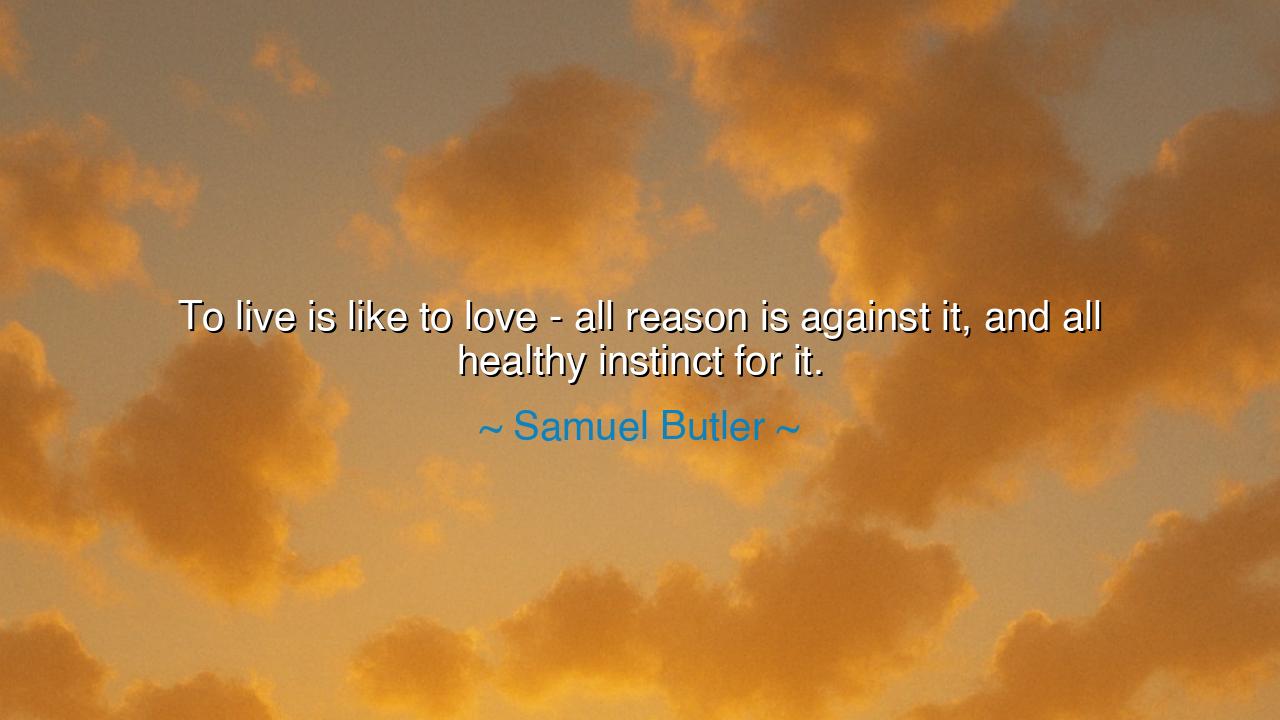
To live is like to love - all reason is against it, and all






In the stillness of reflection, the words of Samuel Butler rise like an ancient bell ringing across the centuries: “To live is like to love — all reason is against it, and all healthy instinct for it.” These are not the idle musings of a dreamer, but the voice of one who has seen the battle between the heart and the mind and knows that life itself is a rebellion against reason. For if we were to listen only to logic, we would never take a step, never risk a dream, never open our hearts to the pain and glory of existence. Reason whispers of danger and futility; instinct cries out for experience, for the fire of being alive.
In this sacred conflict between reason and instinct, Butler captures the eternal paradox of humanity. The rational mind measures, predicts, and fears; it seeks safety in knowing. But the pulse of life — the same pulse that drives the tides and the growth of the seed — knows nothing of such caution. It moves toward light even when the storm rages. Just as love defies logic, so does the act of living. For both demand surrender, vulnerability, and the courage to face loss. Life and love are twin flames born of the same mystery, and neither can be fully known by the mind — only lived through the heart.
Consider the story of Helen Keller, born blind and deaf, shut away in darkness and silence. By reason’s account, her life should have been one of despair. Yet, through her fierce will and the tender guidance of her teacher, Anne Sullivan, she learned not only to communicate but to rejoice in existence itself. Keller once said, “Life is either a daring adventure or nothing at all.” In her, we see Butler’s truth embodied — reason said, “You cannot,” but instinct said, “You must.” And because she listened to that deeper voice, she turned her very limitations into a song of triumph that still echoes today.
The ancients understood this law of contradiction. The Greek hero Odysseus, when faced with the wrath of gods and the endless sea, might well have stayed behind, safe in Ithaca. Yet something deeper than reason — that restless, divine spark — drove him forward into storms and trials. For it is not comfort that gives meaning to life, but struggle, longing, and the will to continue despite the odds. To live, like to love, is to accept both pain and beauty as one. Those who seek to escape suffering by avoiding risk also escape the very joy that makes existence holy.
Butler speaks of healthy instinct, and there lies the secret: not every impulse is sacred, but that which springs from the soul’s deep desire to grow, to connect, to experience truth. Reason may warn, “Do not love; you may be hurt.” Instinct replies, “Love anyway, for in loving you will know what it means to be human.” Reason says, “Do not dream; you may fail.” Instinct answers, “Dream, for without the dream you have already failed.” Thus, to live fully is to honor instinct over fear, to follow the call of life even when the path is uncertain.
Yet, this is not a call to recklessness, but to courage. The wise do not silence reason; they let it serve instinct as a faithful advisor, not a tyrant. The heart must lead, but the mind may light the way. Those who live by reason alone build fortresses of safety — but their walls become their prisons. Those who live only by instinct burn quickly, like meteors. But those who balance the two — who dare greatly while listening deeply — become masters of life.
Therefore, my children, take this teaching into your bones: when your mind hesitates but your heart leaps, trust the leap. When the world tells you it is foolish to hope, hope harder. When fear whispers that life is too painful, remember that even the rose blooms among thorns. The art of living is not to avoid wounds, but to let them open the gates of your soul.
In the end, to live is to love, and both require faith without evidence, courage without guarantee. The lesson is clear: live boldly, love deeply, and do not let reason steal the music of your spirit. For when the ages have passed and the dust of empires has settled, it is not the cautious who are remembered — it is the ones who dared to live as if the world were made for love.






AAdministratorAdministrator
Welcome, honored guests. Please leave a comment, we will respond soon